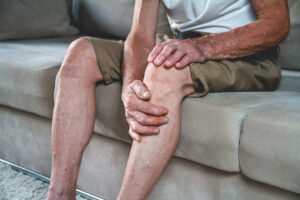Varicose Vein Treatment for Men
Often, people make the mistake of thinking that varicose veins are a problem that only affects women. While this issue is more common in women, affecting 75 percent of females, there are also millions of men who suffer from the same affliction. In fact, about 45 percent of people undergoing varicose vein treatment are men, and varicose veins in men are just as severe as they are in women. Here, we’ll take a look at the causes of this condition, as well as explaining varicose vein treatment for men.
 What puts a man at risk for varicose veins? The risk increases with age, and varicose veins are more likely in men over 50. If the man is obese, a smoker, or has a sedentary lifestyle, particularly one that involves prolonged sitting or standing, he’s at higher risk. Varicose veins are a hereditary condition, but they can develop because of heart disease, leg trauma, cancer, paralysis, and certain medications.
What puts a man at risk for varicose veins? The risk increases with age, and varicose veins are more likely in men over 50. If the man is obese, a smoker, or has a sedentary lifestyle, particularly one that involves prolonged sitting or standing, he’s at higher risk. Varicose veins are a hereditary condition, but they can develop because of heart disease, leg trauma, cancer, paralysis, and certain medications.
While men might resist varicose veins treatment, believing that the problem is simply cosmetic, it’s actually more serious than that. Varicose veins can cause itching, swelling, aching, and skin tenderness, and if they’re left untreated, they can lead to dire medical conditions like blood clots, ulcer, or pulmonary embolism, which can be fatal. Men experiencing symptoms should talk to a vein specialist about the different varicose veins treatments available.
The options used to be limited, but today, there are several different ways to treat varicose veins. Your doctor might start by recommending lifestyle changes like more exercise, a more nutritious diet, and quitting tobacco use. Sometimes treatment for varicose veins involves compression garments that can improve circulation. There are also clinical procedures that are very effective, and most are minimally invasive. Treatments include:
- Endovenous Laser Ablation (EVLA): A minimally invasive lasering technique the closes varicose veins without open surgery.
- Sclerotherapy: Smaller varicose veins are closed with the injection of foam or liquid agents, using ultrasound guidance.
- Radiofrequency ablation: Using radiofrequency energy, the doctor heats the inside of the vein, destroying it so it can be reabsorbed by the body.
- Phlebectomy: In this procedure, the surgeon makes a small incision and removes the entire damaged vein.
If you’re seeking varicose veins treatment or help with other vein issues, trust the board-certified physicians at the Arizona Vein & Laser Institute. Using the most advanced technology, the vascular and cardiovascular surgeons at the Arizona Vein & Laser Institute provide care for all types of venous diseases. With over 40 years of experience, our team of experienced physicians can devise the right treatment plan to address your venous disease problems. For more information contact us through our website.
